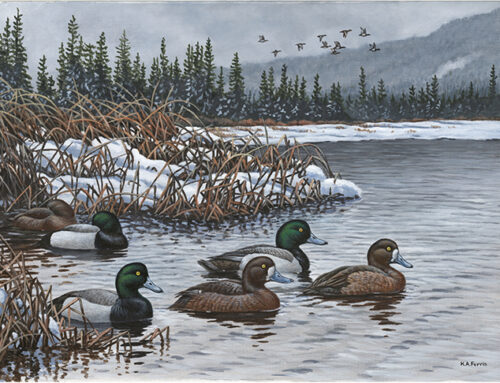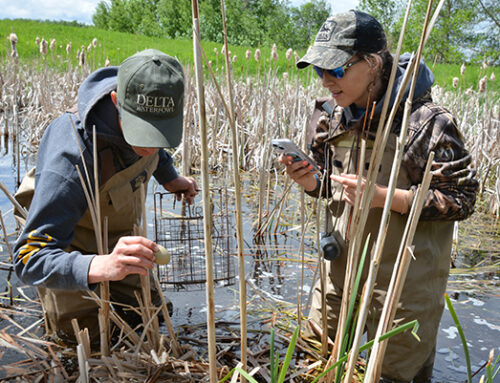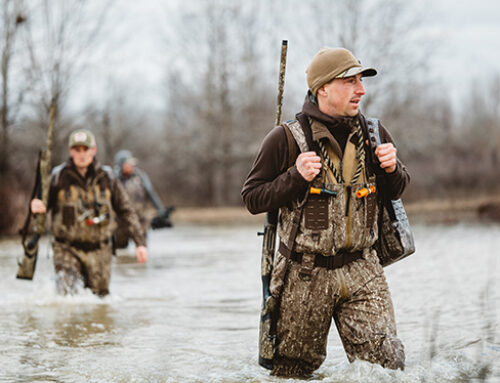The 2024 Delta Waterfowl Science Forum: A Collaborative ‘Meeting of Minds’

Experts and future biologists are united to advance waterfowl research and conservation across North America
The first Delta Waterfowl Science Forum—a two-day meeting of up-and-coming students, Delta Staff, Delta board members, and leading waterfowl scientists from outside of the organization—is estimated to have occurred sometime between 1938, when the Delta Waterfowl Research Station was established, and the beginning of World War II. Though it has not been held every year since its post-war revival, the event has remained a key part of Delta’s history and commitment to innovative, efficient, and impactful waterfowl research.

“I remember when I first attended in 1976—I thought it was the coolest thing,” said Dr. Frank Rohwer, president and chief scientist for Delta Waterfowl. “It’s an invaluable exchange of scientific information, techniques, and learning, particularly on breeding biology and Delta’s ongoing work.”
On the first day of the event this August, students took the floor to present their current research to Delta board members, staff, and outside scientists. Students in particular benefit from this practice by sharing their research, receiving constructive feedback, and networking with future colleagues, collaborators, supervisors, and potential employers.
“It was great to spend time with and hear from all the students, nearly all of whom are supported by Delta,” said Dr. Chris Nicolai, Delta’s waterfowl scientist. “The science forum provides a unique opportunity to exchange knowledge and ideas on waterfowl management, and these graduate students come from all across North America to take part in it.”
The Duck Hunters Organization hosts them in hopes of furthering their careers and feeding their passion as they continue their journey toward becoming biologists. This input also helps the organization align Delta-sponsored projects with the latest advancements.
“All of the students did a fantastic job,” said Rohwer. “The Scientific Advisory Group (SAG) was particularly impressed, noting how important it is that we support so many students.” Following the student presentations, longer talks were given by four scientists from the SAG.
“The Scientific Advisory Group consists of some of the top scientists from across North America,” Rohwer explained. “It’s a great mix—experienced professionals with many years of experience, alongside younger scientists pushing the boundaries of new analytical techniques.”
The current SAG members include Dr. Todd Arnold, Dr. Thomas Riecke, Dr. Ben Sedinger, and Dr. Mark Vrtiska. One member, Chuck Loesch, was not in attendance during this year’s event. Each of the members are leaders in waterfowl research.
The second day of the event shifted the focus to Delta’s own research program. Presentations covered topics ranging from Delta’s extensive history of research to comprehensive reviews of the organization’s Hen House and Predator Management programs and their impacts on duck production in North America.
To round out the discussions, potential research topics that Delta might pursue in the future were presented, opening the floor to the SAG to analyze and critique Delta’s research. They were asked to examine whether Delta is addressing the right topics, whether research funds are being used effectively, and ultimately, to recommend ways that Delta Waterfowl could make a greater impact on waterfowl management.
“Such critiques and constructive criticism from the SAG play a critical role in the trajectory of our research programs,” said Delta CEO, Dr. Scott Petrie. “As The Duck Hunters Organization, we have made a promise to deliver the greatest impact for duck hunters with each dollar spent. It’s not a responsibility that we take lightly, and this is a great way to reinforce the strength and belief we already have in our programs.”
Ultimately, Delta received positive feedback from the SAG about the research approaches and the ways that the organization could combine projects for efficiency in the field.
“Having this group review our research is incredibly valuable,” said Dr. Rohwer. “In addition to their excellent talks on issues like May surveys, sex ratio changes, harvest estimate problems, and innovative hunting and regulatory approaches—such as the two-tier system being tested in the Central Flyway—they offer us direct feedback on how we can improve our research efficiency and effectiveness. It’s a real win.”
Next summer and each one following, this same gathering will take place, bringing together the best minds in waterfowl management for a meeting vital to exchanging ideas, fostering collaboration, and strengthening Delta’s future approaches to waterfowl research.
“This gathering is really special,” said Dr. Petrie. “Delta Waterfowl has an incredible history of training young biologists and scientists and bringing them together for this summer symposium. Not only do we get to work with the future of waterfowl management and help them develop their expertise, but the event also fosters collaboration with the Scientific Advisory Group whose insights into our current research, along with suggestions for future projects, help advance our work for the benefit of North American waterfowl and waterfowl hunters.”
The accompanying images show forum moments from 1958, with Al Hauchbaum—Delta’s first scientific director—in attendance, and from 2024, when participants gathered in front of the same lodge to honor the event’s legacy. Going forward, Delta Waterfowl plans to fully restore this tradition by hosting the Delta Waterfowl Science Forum on an annual basis.






Leave A Comment